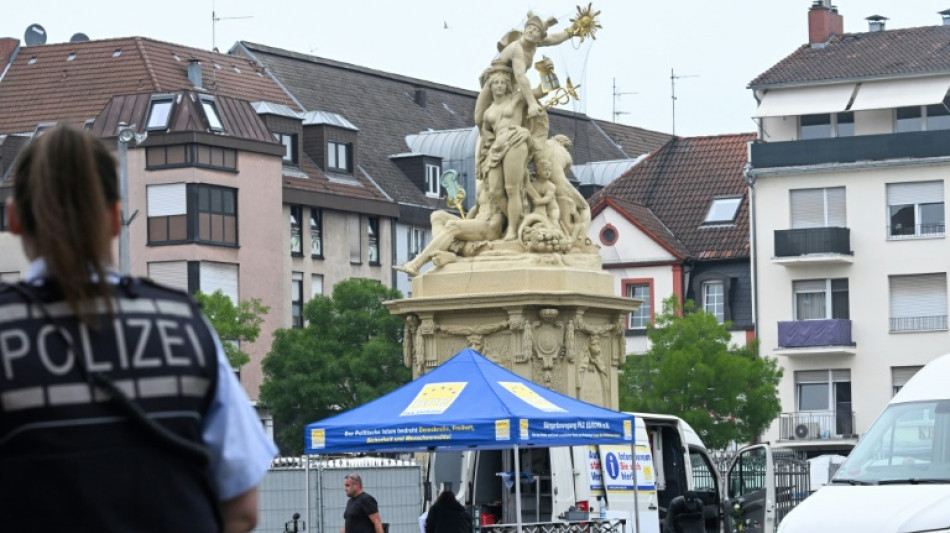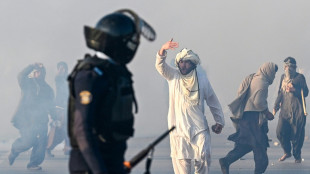

Candidate for Germany's far-right AfD wounded in clash
German police said Wednesday that a local election candidate for the far-right Alternative for Germany (AfD) was hurt in the country's west after confronting a man taking down the party's posters.
A 25-year-old suspect has been arrested but showed no signs of knowing that the victim, Heinrich Koch, was an AfD politician, police said.
The incident threatened to inflame tensions in Germany ahead of local and EU elections this week, following a fatal stabbing at an anti-Islam rally last week in the western city of Mannheim.
Police said they were alerted to a man taking down posters in the Rehinau district of Mannheim on Tuesday evening.
"An AfD politician, who had also become aware of the incident, pursued the suspect," police said.
The suspect is then said to have "injured the AfD politician with a cutter knife", police said.
The 25-year-old fled the scene but was later arrested without resistance by police around 10:30 pm (2030 GMT).
The suspect showed "clear signs of mental illness" and was taken to a psychiatric hospital, police said, adding that there was currently "no concrete evidence that the suspect realised during the attack the victim was an AfD politician".
Koch was taken to hospital but his wounds were not life threatening, police said.
Interior Minister Nancy Faeser condemned the "act of violence against a local AfD politician".
"There is never a justification for violence," Faeser was cited as saying by an interior ministry spokesman.
- Election run-up -
Several regions, including Baden-Wuerttemberg where Mannheim is the second-largest city, are holding municipal elections on June 9, the same day as elections to the European Parliament.
Representatives of the AfD earlier on Wednesday presented the incident involving their candidate as an attack.
"In Mannheim, our local council candidate Heinrich Koch was injured with a knife while confronting people destroying a poster," the AfD's national co-leader Tino Chrupalla posted on X.
"Our members and representatives are the most common victims of political violence," Chrupalla said.
Such incidents "cannot stop us", he added.
The incident came five days after a 25-year-old Afghan man attacked an anti-Islam rally on the market square in Mannheim, killing one and injuring five.
The attack on Friday targeted an event organised by Pax Europa, a campaign group against radical Islam.
Five people attending the rally were injured, including far-right activist and blogger Michael Stuerzenberger.
A 29-year-old policeman who intervened in the incident was stabbed multiple times in the area of the head and died from his wounds on Sunday.
The attacker was shot and wounded by police at the scene. The suspect faces possible charges of murder, attempted murder and five counts of serious bodily harm.
Federal prosecutors are still looking into the reasons for Friday's attack, while several government officials have pointed to a possible Islamist motive.
- Political violence -
Germany has seen a spate of attacks on politicians from across the political spectrum at work or on the campaign trail ahead of EU elections.
Matthias Ecke, a European Parliament lawmaker for Chancellor Olaf Scholz's SPD party, was set upon last month by a group of youths as he put up election posters in the eastern city of Dresden.
Days later, former Berlin mayor Franziska Giffey was hit on the head and neck with a bag as she visited a library in the capital.
Senior members of the government have also been confronted by angry mobs in recent months, with Economy Minister Robert Habeck blocked from leaving a ferry by a group of protesters.
President Frank-Walter Steinmeier last month warned that Germans "must never get used to violence in the battle of political opinions".
Steinmeier's statement came around the five-year anniversary of the killing of conservative politician Walter Luebcke, who was murdered by neo-nazis in 2019.
M.Schulz--MP




